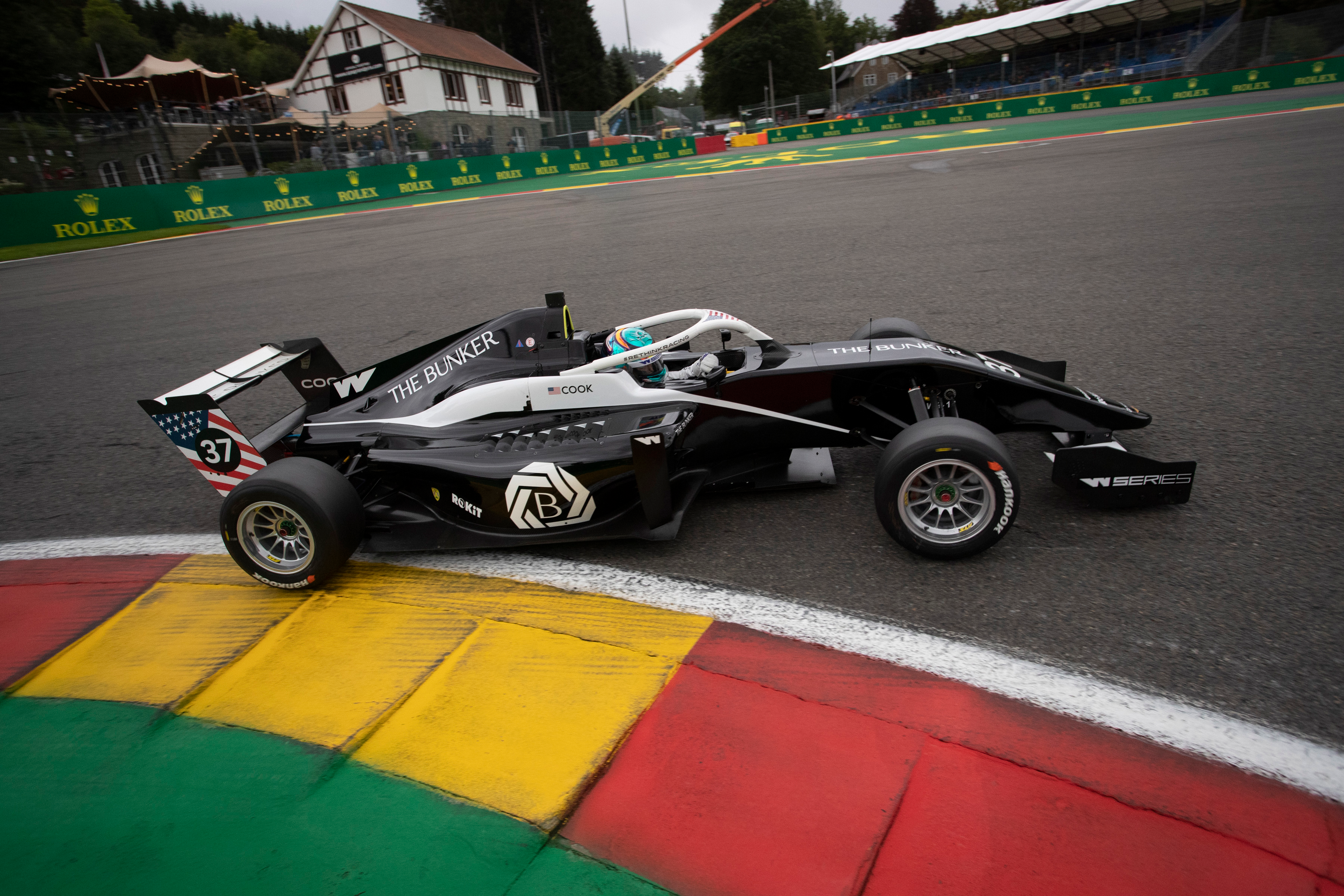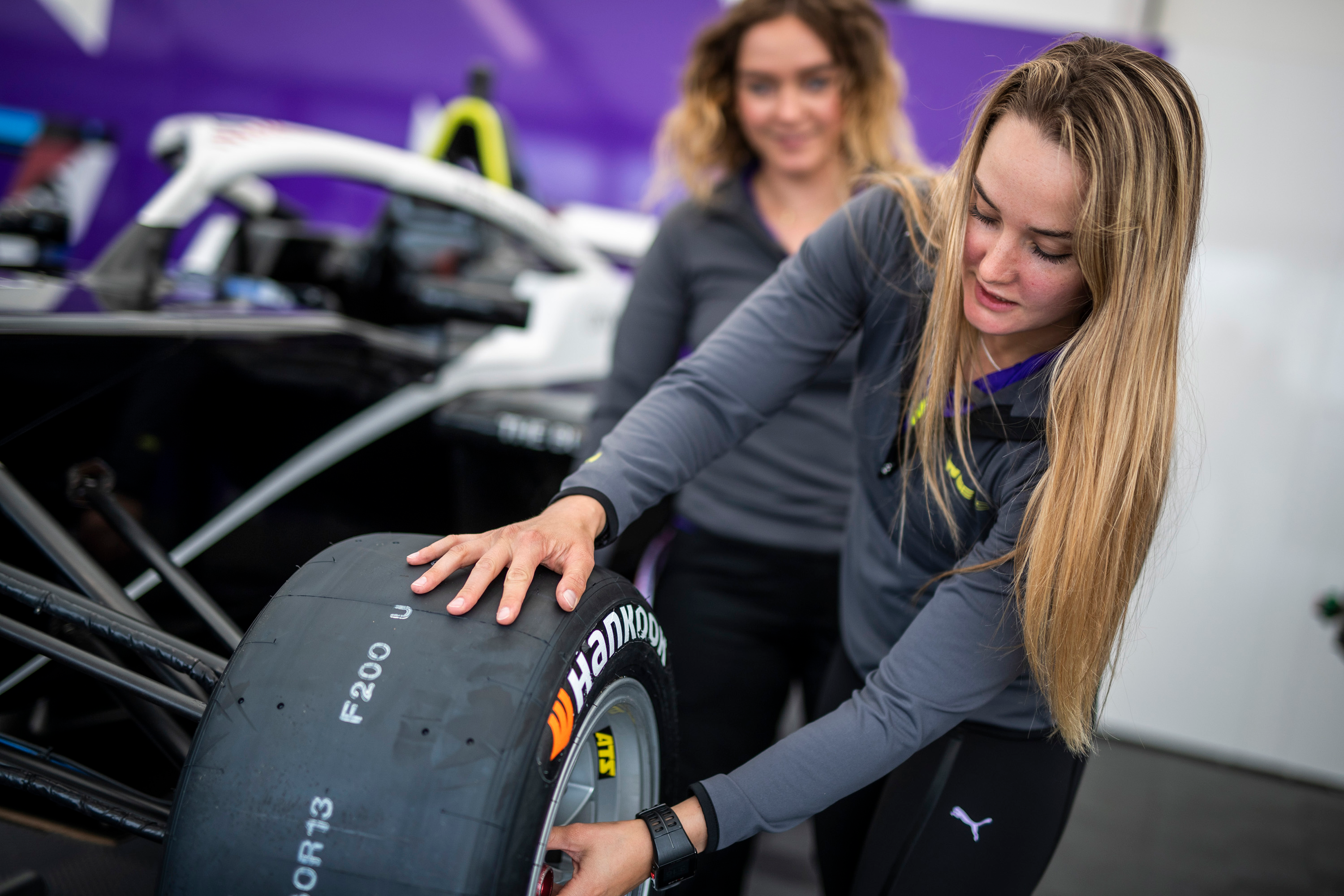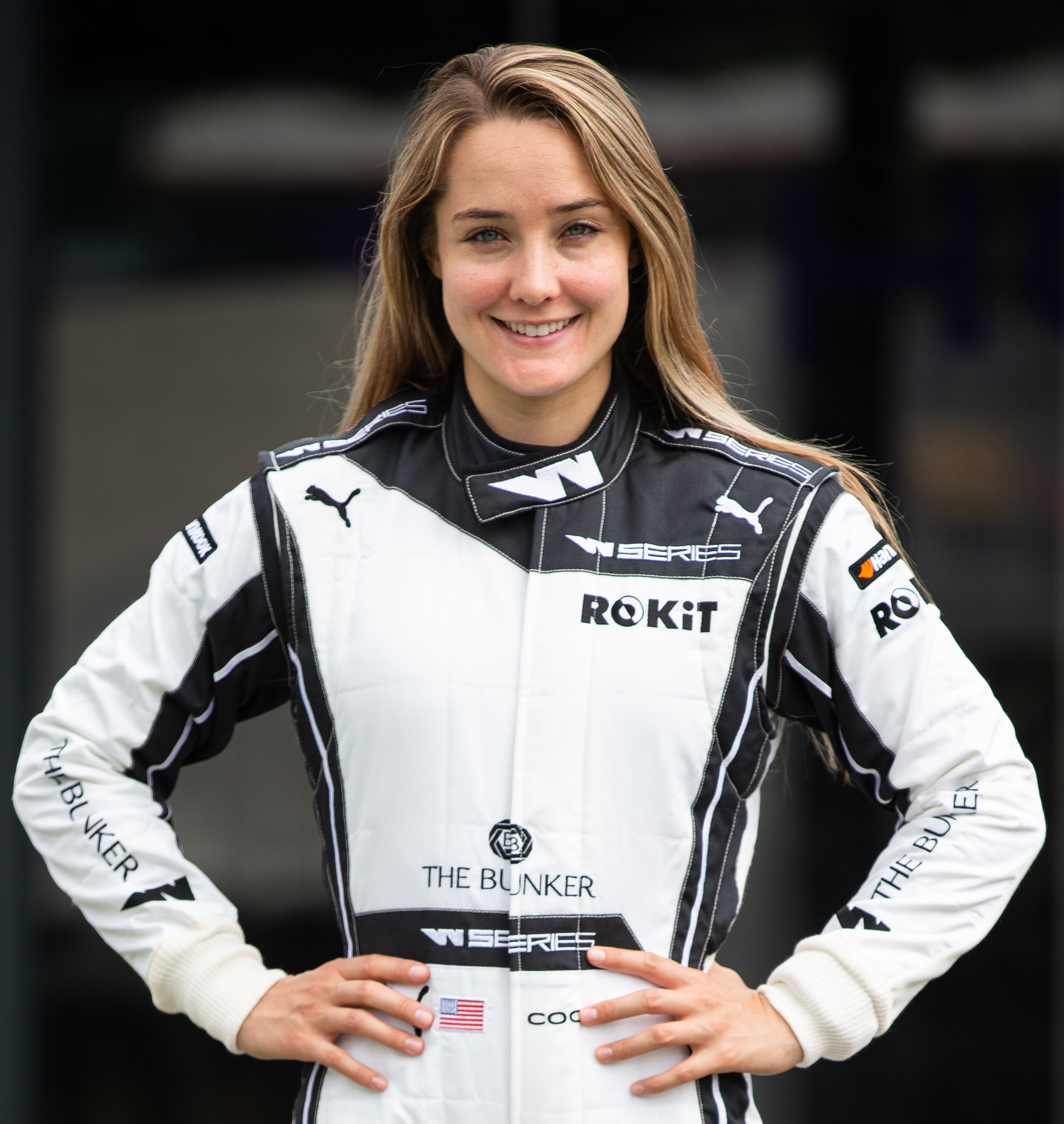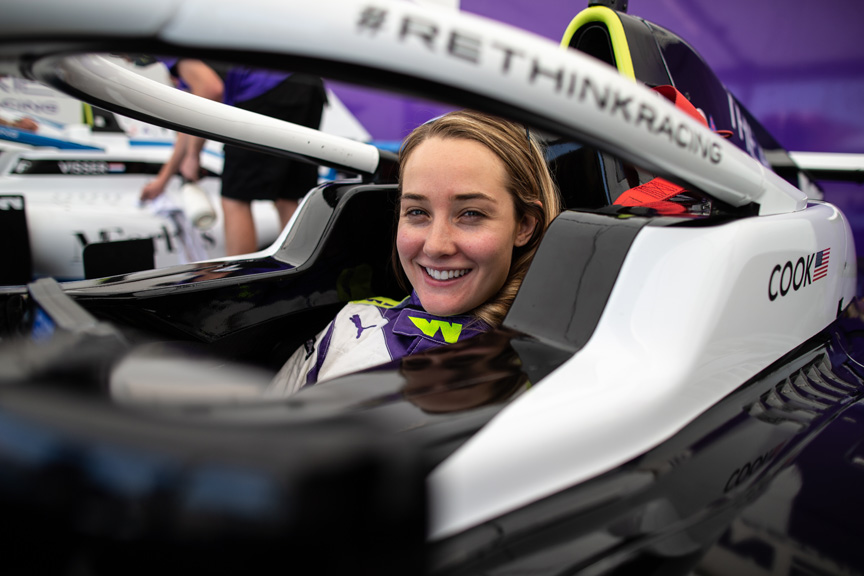American Racer Sabré Cook On The W Series And What It Takes To Find Sponsorship
Sabré Cook started racing cars professionally while she was finishing her mechanical engineering degree.
If you're the kind of motorsport fan who keeps up with the next American tipped to make it big in the open-wheel scene, or who likes to keep an eye on promising women in the sport, then you've heard of Sabré Cook, which she pronounces "say-bra."
"I was born into [racing] in a way," the Grand Junction, Colorado native said in a recent interview with Jalopnik. "My father used to race motocross and supercross professionally, and he founded karting after he retired. I can't even remember at the time that I was like, 'Oh yeah, this is cool.'
"But I remember thinking that this is something I wanted to do for the rest of my life when I was 13 and I won my first world championship. It was very tough, character building weekend, and then it ended up working out in the end. And I just remember after I crossed the finish line, I was just like, 'Wow, this is such a special feeling. This is such a special sport and I could do this forever.'"
Cook got her start, like many modern racers, in karting, where she racked up wins and championships. She's won scholarships for the Road to Indy, been invited to join the Infiniti Engineering Academy, and has been the first woman to take victories in various divisions of racing.
And if you think her racing career is impressive, then just wait: while attending the Colorado School of Mines in pursuit of her mechanical engineering degree, she was involved in the Society of Automotive Engineers, Formula SAE, the Alpha Phi-Iota Zeta International Fraternity, the Society of Women Engineers, and the American Society of Mechanical Engineering.
With so much on her plate, it's easy to imagine that pursuing motorsport full-time was something of a relief.

In 2019, Cook was one of 18 racers selected to compete in the W Series, an all-female open-wheel racing division that is entirely free to enter. Racers from around the world competed to have a chance to further their careers based on on-track talent, social media savvy, and business sense — all of which are crucial components of launching a successful racing career — with the hope of achieving the $500,000 awarded to the championship winner. But, as I mentioned to Cook, the series hasn't been without its criticisms.
"Initially, when it came out, I was like, 'I don't know about this, I want to race against the guys. There's no need for this,'" Cook admitted. "But in every other series, I still race against the guys. When I went to the first event is, they were just like, 'This series wasn't created to separate you. And it wasn't created to say, you can't do it with a man. This is just basically a stepping stone to give you more room to develop and grow, so that way you can go back and do better against the boys.'"
Cook, like many of the other competitors in the series, was soothed by that assurance. And, as a former skeptic myself, I have to admit that there's something undoubtedly nice about watching a slew of talented women hitting the track to show what they're made of without any other distractions.
But Cook shared something that many fans may not realize from the outside: The series is staffed with female talent in many other roles.
"We have so many women engineers and mechanics that, even if they're newer to motorsports, they can be brought in under mentee roles. So they still get that experience with people that have been in the sport for years and years. We've got a massive management and media team. And so someone as a woman that's maybe interested in motorsport, maybe they don't want to be a driver or a mechanical engineer, can still get involved on the business and marketing and management side of things," Cook said.
That, in and of itself, is a smart idea. The W Series isn't just a pipeline for talented racers — it's providing crucial experience for women in all aspects of motorsport so that, in a few years, we may start seeing a bigger influx of women managing race teams or calling strategies for top-name drivers.
"There's literally a place for women to get involved from beginning to end," Cook said. "That's essentially what they've created W Series to do."

The fact that the W Series doesn't require its drivers to pay their way into a seat with old family money or hard-sought sponsorship cash is one of its other great victories. Some women in the series have used it to revive a career that stagnated because sponsorship was so difficult to come by. Other women are getting their first shot at international competition for the same reasons.
Cook has been no stranger to the sponsorship struggle. Despite the successes that have created the foundation of her racing career, she's only been able to go so far with the money she's been able to drum up. For example, Cook had intended to race in the W Series in 2020 before the series was postponed due to COVID-19; instead, she attempted to mount an American open-wheel campaign in Indy Pro 2000, only to run out of money two rounds into the season.
Pursuing funding, she told me, is a highly variable process. If you find the right sponsor, you can wrap up a deal in a month. Other times, it might take you a year to negotiate with a company.
Cook also laid out a perfect world scenario, the steps it would take to find a sponsorship without any hang-ups.
"First, maybe you get the contact through one of your current business contacts, through someone that may be a family friend who knows that you're looking for funding and they have a contact into a company that might be interested and match up with you brand wise," she said. "Or the company could even reach out to you and say, 'Hey, we like what you're doing. What are your plans?' And then you start your initial conversation, your initial talks. You get a gauge, you basically tell them what you're doing, what you want to do.
"If it progresses from there, then they'll ask to see probably your social media metrics. They'll try to see what your interactions, your engagements are. And then they'll basically gauge whether or not your brand is valuable to them. From there, hopefully then you'll start talking numbers. Usually you start out with a deck and then you move on to a proposal. The proposal hammers off the hard numbers, and then also lists cut-and-dry what they would get and what that would cost. And then obviously you'd go through negotiations on that and basically come up with a final agreement. Then you have a contract that outlines all that, and then both parties sign the contract."
Sounds exhausting, right? As Cook told me, "Even in a merry world, all of this takes a lot of back and forth."
And that's if things even work out: "The majority of time, things don't even progress past the initial talks, or maybe you give them the proposal, and then they decide to go in a different direction, or you get all the way to the contract, and they've decided to do something different."
Add onto that questionable managers — people Cook said who can take a retainer fee but offer nothing in return, or who sign on to help you but never actually do anything — and the prospect of racing if you're not already independently wealthy can be an incredibly daunting task.
That makes what the W Series is offering — a free-to-enter series that could pay out up to $500,000 — a very handsome proposal indeed.

Thankfully for her, Cook has also qualified as one of 10 finalists for IMSA's Drive for Diversity scholarship, which will provide $250,000 of funding to one driver who has demonstrated both on-track talent and the ability to raise the rest of the money needed to compete in a full season of IMSA sports car racing in 2022.
Cook isn't daunted by the fact that many of her competitors in the scholarship already have close ties to the IMSA series.
"I'm going to go to VIR this weekend to talk to a few teams, talk with IMSA, and, fingers crossed, you never know what could happen," she said. "I have a lot of people in my corner that want to see me in the series. So I'm really hoping that I can put it all together."
But she also doesn't believe that winning or losing the scholarship will serve as a make-or-break moment for her career. "It's obviously great, and it will give me more leverage with sponsors. But at the end of the day, it's all about what the company sees as what your brand can provide their company as value," she said.
All that being said, one of Cook's goals is to drive an IMSA DPi car, the top tier of the series. Having a shot at IMSA in 2022 with a bit of backing from the series itself certainly wouldn't hurt that goal.

At the end of the day, Cook dreams of competing in the IndyCar series, which has played host to many of the drivers who have served as her inspiration — people like Helio Castroneves or Janet Guthrie, the latter of whom was the first woman to compete in the series' premiere event, the Indy 500.
Where many drivers might dream of winning a championship in IndyCar or taking home that coveted 500 victory, Cook has kept her hopes far more manageable. "I would love to do a full season," she told me. "That would be cool."
She'd be in good company in that respect. Only a handful of women — Katherine Legge, Simona de Silvestro, Milka Duno, Danica Patrick, and Sarah Fisher — have contested at least one full season of IndyCar competition.
When I asked her what she hopes her legacy will be in the sport, she hardly mentioned any specific on-track goals. Instead, she said, "I hope that I can inspire and provide tools and information in the long run for girls to come up through and take a better path than I did. And make it easily accessible to have the resources and really know what it takes and what you really actually have to do on a day to day basis in order to make it. Because I feel like, even for anyone, male, female, racing is a bit unknown."
She has other goals outside of motorsport as well. Cook hopes that, one day, she'll be able to find a way to pair veterans up with dogs in need to provide both with the kind of soul-sustaining companionship that the animal-human connection can provide.
But for now, Cook is on the cusp of a highly successful motorsport career, and it won't be long before we see her name in the big leagues.
